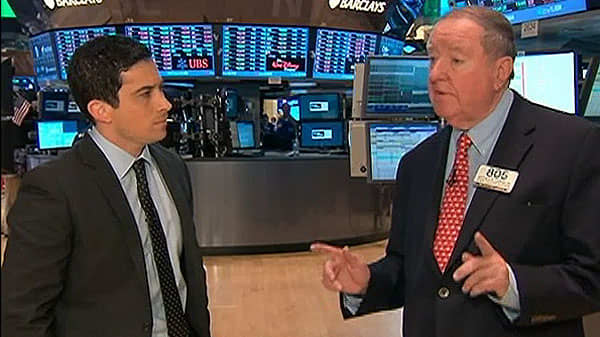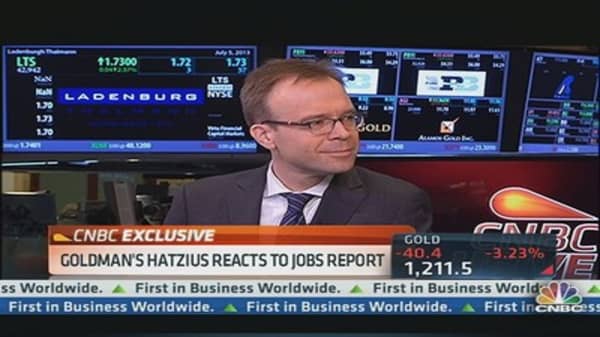Stocks jumped in a choppy trading session Friday, extending gains heading into the close, after a strong jobs report indicating an improving U.S. economy offset worries about a sooner-than-expected end to Federal Reserve bond buying.
The Dow Jones Industrial Average climbed back above the 15,000 level, propelled by gains in American Express and JPMorgan.
The S&P 500 and the Nasdaq were also strongly higher. The CBOE Volatility Index (VIX), widely considered the best gauge of fear in the market, traded near 15.
The S&P 500 finished above its 50-day moving average of 1626. "All week this trendline has held back the bulls," said Ryan Detrick, senior technical strategist at Schaeffer's Investment Research. "Still, the more important area could be the Russell 2000 Index 1,000 region. This area has held as resistance since May and won't go down without a fight."
With those areas breached on Friday, Detrick said "it could signal we could have a strong July rally."
Among S&P sectors, financials and industrials paced the advance, while utilities fell.
Small-cap stocks and regional banks were among the market leaders. "These are the sectors you want to see leadership from," Detrick said, since they are closely tied to the U.S. domestic economy.
Home builders were among the weakest industry groups as investors fret about what higher interest rates will mean for the housing recovery.
For the week, the Dow gained 1.5 percent, the S&P 500 was up 1.6 percent and the Nasdaq jumped 2.2 percent.
The U.S. economy created 195,000 new non-farm payroll jobs in June, the Labor Department reported, after an upwardly revised 195,000 jobs were created in May. The unemployment rate was unchanged at 7.6 percent as more people entered the labor market.
The jobs report means the economy is improving and it's on track to at least pick up a little bit of momentum, Robert Pavlik, Banyan Partners' chief market strategist, told CNBC.
"I think the market is going to continue to move higher even as we approach the July meetings," he said. But as it gets closer to September "the possibility that market gets a little bit worried about the move up in Treasury yields comes back into play."
The dollar jumped to a three-year high and 10-year Treasury yields pushed above 2.70 percent given the stronger data and growing anticipation of Fed tapering. Gold tumbled 3 percent.
(Read More: Why Higher US Yields Should Cheer Investors)
"Combing through the details of the release, there is not too much to sniff at, and overall, the June report easily gets passing marks," JPMorgan economist Michael Feroli wrote in a research note, adding "after today's report we are moving to a call for a first reduction in asset purchases at the September FOMC meeting."
Markets had been awaiting the jobs report for clues as to when the Federal Reserve would begin reducing its bond purchases. The Fed has said it expects to end its $85 billion monthly asset purchases when the unemployment rate drops to around 7 percent.
Jan Hatzius, Goldman Sachs chief economist, also is now calling for a September tapering. "It's not a done deal. It could still be December," he told CNBC. "But when I take everything together—what they've said, what you've seen in the numbers— September is more likely."
While the U.S. central bank may be closer to pulling back on the bond purchases, yesterday, both the European Central Bank and the Bank of England offered forward guidance on policy for the first time, and said record-low interest rates would be maintained for a prolonged period.
(Read More: July 4: Independence Day for Europe's Central Banks?)
Among stock movers, Dell was sharply lower on reports Michael Dell and Silver Lake will not raise their $24.4 billion buyout bid.
Attention will turn to corporate earnings next week. Second-quarter earnings season kicks off with numbers from Dow component Alcoa on Monday.
Pavlik of Banyan Partners isn't expecting a blowout earnings season. "I think that Q2 earnings season is largely going to be a repeat of Q1 and you will see a good increase in earnings per share, but you're not going to see a tremendous increase in revenue which could create problems for the intermediate term," he said. "But short term, I think the market moves higher."
—By CNBC's Justin Menza. Follow him on Twitter @JustinMenza.





